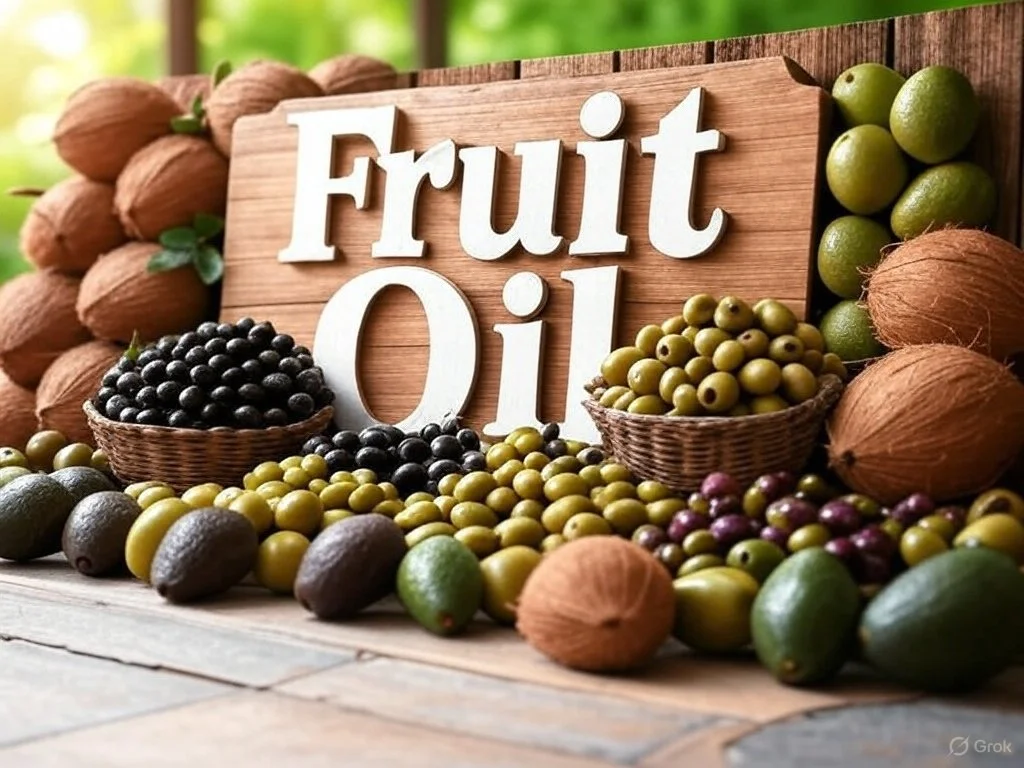The Case for Fruit Oils: A Healthier Path Forward
When we think of cooking oils, the term "vegetable oil" often dominates the conversation, conjuring images of generic bottles of canola, soybean, or corn oil lining supermarket shelves. However, not all oils are created equal, and a closer look reveals that some of the healthiest oils come not from vegetables but from fruits. Olive, avocado, and coconut oils—derived from the fleshy pulp of their respective fruits—are nutritional powerhouses that deserve a distinct identity: fruit oils. By understanding their unique properties, contrasting them with vegetable oils, and adopting the term "fruit oil," we can empower people to make better dietary choices for their health.
What Are Fruit Oils?
Fruit oils are extracted from the pulp or flesh of fruits, unlike vegetable oils, which typically come from seeds, grains, or legumes. The three most prominent fruit oils are:
Olive Oil: Olive oil is a staple of the Mediterranean diet, sourced from the fruit of the olive tree. Extra virgin olive oil, in particular, is minimally processed and retains high levels of antioxidants, polyphenols, and monounsaturated fats.
Avocado Oil: Pressed from the creamy flesh of avocados, this oil is rich in monounsaturated fats, vitamin E, and anti-inflammatory compounds. Its high smoke point makes it ideal for cooking, while its mild flavor suits dressings and dips.
Coconut Oil: Derived from the meat of mature coconuts, coconut oil is high in medium-chain triglycerides (MCTs), which are easily metabolized for energy. It's versatile for cooking, baking, and even skincare.
These oils share a common trait: they come from the nutrient-rich pulp of fruits, not the starchy or fibrous seeds used for vegetable oils. This distinction is key to their health benefits.
Fruit Oils vs. Vegetable Oils: A Nutritional Divide
Vegetable oils, such as canola, soybean, corn, and sunflower oil, are often marketed as heart-healthy, but their production and composition tell a different story. Most vegetable oils are extracted from seeds or grains through industrial processes involving high heat, chemical solvents like hexane, and refining that strips away nutrients. The result is an oil high in omega-6 fatty acids, which, when consumed in excess, can promote inflammation, a root cause of heart disease, diabetes, and other chronic conditions.
In contrast, fruit oils are typically less processed. Extra virgin olive oil and unrefined avocado and coconut oils undergo minimal processing, preserving their natural antioxidants, vitamins, and healthy fats. Here's a breakdown of the differences:
Fatty Acid Profile: Fruit oils are rich in monounsaturated fats (olive and avocado) or medium-chain saturated fats (coconut), which are linked to improved cholesterol levels and metabolic health. Vegetable oils, however, are often high in omega-6 polyunsaturated fats, which can disrupt the body's omega-3 to omega-6 balance, contributing to inflammation.
Processing: Fruit oils, especially extra virgin or unrefined varieties, are cold-pressed or mechanically extracted, retaining their natural compounds. Vegetable oils undergo refining, bleaching, and deodorizing, which can introduce harmful byproducts like trans fats.
Nutrient Content: Fruit oils contain antioxidants (like polyphenols in olive oil), vitamins (like vitamin E in avocado oil), and other bioactive compounds. Vegetable oils, due to heavy processing, often lack these beneficial nutrients.
Health Outcomes: Studies consistently link olive oil to reduced risks of heart disease, stroke, and cognitive decline, particularly in Mediterranean populations. Avocado oil supports heart health and may reduce LDL cholesterol. Coconut oil, while controversial due to its saturated fat content, has shown benefits for weight management and energy metabolism when used in moderation. Conversely, high consumption of vegetable oils is associated with increased risks of heart disease, obesity, and inflammation-driven conditions.
Why "Fruit Oil" Matters
The term "vegetable oil" is a catch-all that misleads consumers. It lumps together oils from seeds, grains, and even fruits, obscuring the nutritional superiority of olive, avocado, and coconut oils. By adopting the term "fruit oil," we can create a clear distinction that highlights their unique origins and health benefits. This simple change in terminology could guide consumers toward better choices, much like how "whole grains" became a shorthand for healthier carbohydrates.
Labeling these oils as fruit oils also aligns with their botanical origins. Olives, avocados, and coconuts are fruits, not vegetables, and their oils are derived from the nutrient-dense pulp, not seeds. This distinction resonates with the growing demand for natural, minimally processed foods. It also empowers consumers to prioritize oils that support long-term health over cheap, industrially produced alternatives.
Incorporating Fruit Oils into Your Diet
Switching to fruit oils is easier than you might think. Here are practical ways to make them a staple in your kitchen:
Olive Oil: Use extra virgin olive oil for salad dressings, drizzling over roasted vegetables, or dipping with whole-grain bread. Its robust flavor enhances dishes without overpowering them. For low-heat cooking, it's a great choice, though avoid high-temperature frying to preserve its nutrients.
Avocado Oil: With its high smoke point, avocado oil is perfect for sautéing, roasting, or grilling. Its neutral taste makes it a versatile option for baking or blending into smoothies for a nutrient boost.
Coconut Oil: Ideal for baking, stir-frying, or adding to coffee for a creamy, energizing twist, coconut oil shines in both sweet and savory dishes. Opt for unrefined versions to maximize flavor and health benefits.
When shopping, look for terms like "extra virgin," "cold-pressed," or "unrefined" to ensure you're getting the highest-quality fruit oils. Store them in cool, dark places to maintain their freshness and potency.
A Call to Action: Embrace the Fruit Oil Revolution
The evidence is clear: olive, avocado, and coconut oils offer superior health benefits compared to vegetable oils. By adopting the term "fruit oil," we can reshape how people perceive and choose cooking oils, steering them away from inflammation-promoting vegetable oils and toward nutrient-rich alternatives. This shift isn't just about semantics—it's about empowering individuals to make informed decisions that enhance their health and well-being.
Next time you're at the grocery store, skip the generic "vegetable oil" and reach for a bottle of olive, avocado, or coconut oil. Advocate for the term "fruit oil" in conversations, recipes, and even on social media. Together, we can redefine the narrative around cooking oils and pave the way for a healthier future.





